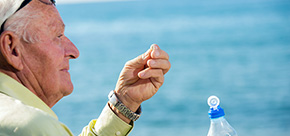For many people, taking medicines is a normal part of daily life, whether they’re at home, or enjoying themselves on the high seas. If you’re planning a first cruise, however, there are a few things to consider with it comes to your daily meds.
Check that your medications are legal
While generally, there are no issues with a person bringing medicines on board a cruise ship, some prescriptions, over the counter drugs and complementary therapies which you can buy in Australia may be illegal elsewhere. For example, individuals are not allowed to take codeine, and any products containing codeine, into the United Arab Emirates, including Dubai. If you’re visiting on a cruise, this shouldn’t pose a problem unless you’re disembarking a cruise in a country with strict rules, or you fly into the country to join your cruise. If in doubt, check with the embassy before you go.
Always carry copies of your prescriptions with you
If you’re taking any regular medicines, or take some occasionally, play it safe and carry a full set of current prescriptions with you on your cruise. If you need to see the ship’s doctor for any reason, or need additional supplies, this will save you time and hassle. It’s also a good idea to be familiar with the active ingredient in any regular medicines. This helps if you need to visit an onshore pharmacy, and ensures you don’t double up on doses of the same active ingredient, which could be dangerous.
Pack a good supply of your regular medications
Rather than rely on seeing a ship’s doctor, or visiting a pharmacy overseas, it’s better planning to organise and take enough of your prescription medicines with you for your entire trip, and even a bit more, in case you need to be away from home for longer than expected. Also pack them in your carry-on bag, rather than your check-in luggage, in case the latter goes astray. That way you won’t be without any of your medicines, especially anything essential.
Store your medicines carefully
Keeping your medicines in their original packaging is important, as it identifies what they are, includes doses, and can minimise potential damage in transit. Anyone travelling with medicines or syringes should carry a prescription with them, and if they are ‘controlled’ or injectable drugs, take a permission letter from your GP. Keeping your medicines cool, and away from sunlight, is also important when travelling, as heat and sunlight can result in them not working properly, or losing their effectiveness before the expiry date. Ask your doctor or pharmacist for advice if unsure.
To find out more about cruising or to find the cruise of your dreams within your budget, visit CruiseGuide.com.au.

